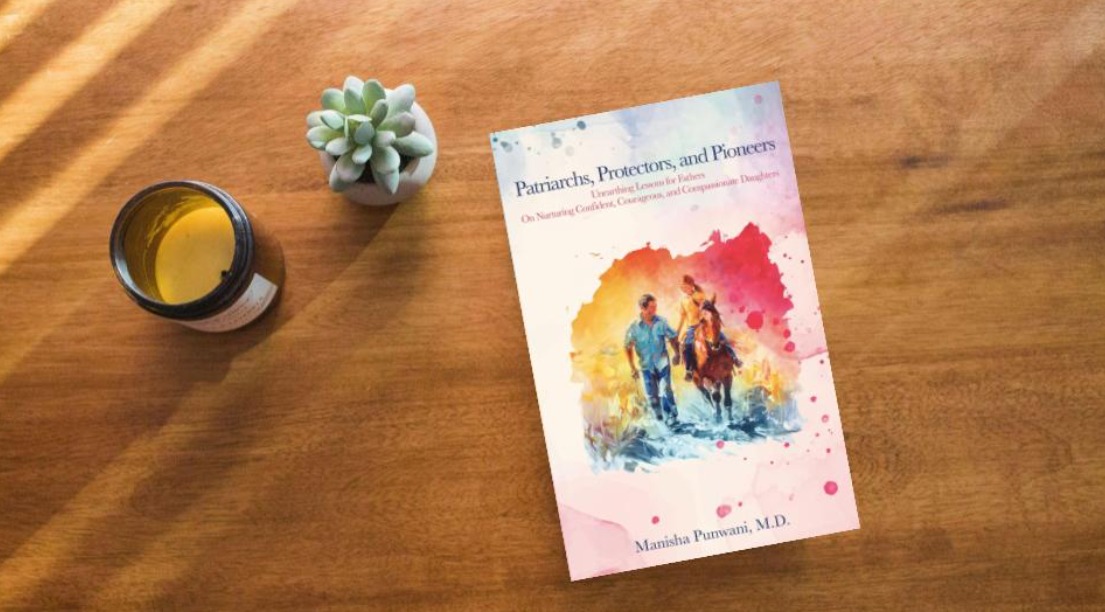A much needed parenting guide in today’s digital age!
In a world where the focus on parenting often disproportionately leans towards motherhood, the profound and multifaceted role of fathers is sometimes overlooked or simplified. Yet, the relationship between a father and his daughter is one of the most influential, emotionally complex, and foundational relationships in a woman’s life. Dr. Manisha Punwani’s Patriarchs, Protectors, and Pioneers: Unearthing Lessons for Fathers on Nurturing Confident, Courageous, and Compassionate Daughters brings that vital bond to center stage with empathy, depth, and an inspiring vision. In the digital age where parenting continues to become more complicated with every day, this book stands out as a guideline and a direction for developing and nurturing a healthy relationship between fathers and daughters, which stems from the experience of the author.
Dr. Punwani, an esteemed psychiatrist specializing in adult, adolescent, and pediatric care, blends her clinical understanding of human behavior with a storyteller’s sensibility and a deep reverence for the father-daughter dynamic. The result is a heartfelt, enlightening, and often emotional journey through time, culture, and personal growth. This book is not merely a parenting guide; it is a powerful commentary on fatherhood as a transformative force—both in a daughter’s life and in society at large. From the very first page, Dr. Punwani makes it clear that fatherhood is not to be seen as a passive or secondary role. Rather, she portrays it as an extraordinary responsibility, a vocation that demands intentionality, emotional intelligence, and courage. She redefines the modern patriarch—not as an authoritarian figure, but as a loving guide, a consistent protector, and a visionary mentor who nurtures his daughter’s emotional and intellectual growth.
The book challenges traditional and outdated gender roles, breaking down societal stereotypes that confine men to stoicism or detachment. Fathers, the author argues, are not just providers or disciplinarians; they are emotional anchors who help shape their daughters’ identities, self-worth, and capacity to love and lead. Their words become inner voices. Their support becomes strength. Their presence (or absence) echoes into adulthood. What makes Patriarchs, Protectors, and Pioneers especially compelling is Dr. Punwani’s unique method of storytelling. She pulls threads from mythology, literature, cinema, and historical records, creating a rich tapestry of examples that illuminate the father-daughter bond from diverse angles. These are not just references to well-known stories; they are deeply analyzed lessons in character, behavior, values, and emotional nuance.
From the mythological King Janaka’s wisdom in raising Sita, to the tenderness of Atticus Finch in To Kill a Mockingbird, to the modern resilience displayed by real-life fathers fighting societal norms for their daughters’ rights—each example serves as a mirror and a lesson. Dr. Punwani offers readers both inspiration and instruction through these timeless narratives, carefully selected to span cultures, continents, and generations. Her use of stories is never ornamental; each one is interwoven with psychological insights and reflections that help the reader understand not just what to do, but why it matters. She connects these stories to real-life scenarios and challenges that modern fathers face—making the content accessible, relatable, and actionable.
As a psychiatrist, Dr. Punwani brings a layered and clinical understanding to her exploration. She writes about the impact of paternal validation on a daughter’s self-esteem, the importance of fathers modeling respectful behavior, and the critical role they play in teaching daughters how to set boundaries, deal with conflict, and trust their intuition. She delves into how a father’s communication style, emotional availability, and even body language can shape a daughter’s emotional landscape. Importantly, she doesn’t present a one-size-fits-all model. Instead, she encourages fathers to understand their daughters as individuals—each with unique temperaments, dreams, and struggles—and adapt their parenting style to meet them where they are. The book also explores the reciprocal nature of this relationship. Fathers, too, evolve because of their daughters. They grow more empathetic, more patient, more self-aware. In many ways, daughters serve as mirrors for their fathers’ own emotional development. This dynamic, though often underexplored, is beautifully and thoughtfully presented.
One of the most important contributions this book makes is its advocacy for breaking the societal expectations that often limit the emotional expression of men. Dr. Punwani addresses how cultural norms—especially in patriarchal societies—discourage men from displaying vulnerability or affection. She shows how damaging these norms can be and how essential it is to challenge them, especially when raising daughters who deserve emotional openness and unconditional love. She highlights the courage it takes for fathers to redefine masculinity—not through dominance, but through empathy and strength of character. She writes movingly about men who have challenged cultural norms to uplift their daughters’ lives—fathers who have supported their daughters’ education, who have encouraged them to dream boldly, who have protected their emotional integrity as fiercely as their physical safety. While the primary audience for this book is undoubtedly fathers, its reach extends beyond that. Mentors, teachers, uncles, grandparents, and even mothers will find immense value in the insights offered. The book invites all readers to reflect on how father figures shape the lives of girls—and how societal change begins at home.
Moreover, women reading this book will find themselves reflecting on their own experiences with their fathers. It’s a book that may spark healing, gratitude, or even a reevaluation of one’s past. In doing so, it contributes to the larger dialogue on generational cycles, emotional legacies, and the power of love to transform. Dr. Punwani’s writing is warm, lucid, and sincere. She balances intellectual rigor with emotional accessibility, making the book both engaging and informative. Her tone is empathetic, never prescriptive or judgmental. She understands the complexities of real-life parenting and meets readers with compassion, not perfectionism.
Each chapter is structured with a blend of story, analysis, and takeaway lessons. The pacing allows for deep reflection, and the narratives are carefully chosen to maintain emotional engagement. Despite the serious nature of the subject, the tone remains hopeful and empowering throughout. Patriarchs, Protectors, and Pioneers is more than a parenting manual—it is a celebration of fatherhood in its highest form. It is a call to action for men to show up fully, to lead with empathy, and to raise daughters who are not only confident and courageous but also compassionate and self-aware. Dr. Manisha Punwani has given us a treasure trove of wisdom, stories, and insights that will resonate deeply with anyone who has ever loved, mentored, or been inspired by a daughter.
In a time where conversations around gender, parenting, and emotional well-being are more important than ever, this book is timely, necessary, and transformative. It reminds us that the journey of fatherhood is not just about raising daughters—it’s about raising humanity. A masterfully written, emotionally resonant, and intellectually insightful guide that redefines what it means to be a father. This book is a must-read not just for dads, but for anyone who believes in the power of love, presence, and purpose to shape a better world—one daughter at a time.




